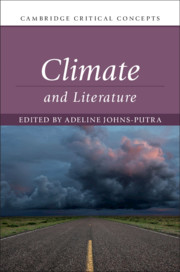Book contents
- Climate and Literature
- Cambridge Critical Concepts
- Climate and Literature
- Copyright page
- Contents
- Illustrations
- Contributors
- Acknowledgements
- Introduction
- Part I Origins
- Part II Evolution
- Chapter 7 Weather and Climate in the Age of Enlightenment
- Chapter 8 British Romanticism and the Global Climate
- Chapter 9 The Literary Politics of Transatlantic Climates
- Chapter 10 Climate and Race in the Age of Empire
- Chapter 11 Ethereal Women: Climate and Gender from Realism to the Modernist Novel
- Chapter 12 Planetary Climates: Terraforming in Science Fiction
- Chapter 13 The Mountains and Death: Revelations of Climate and Land in Nordic Noir
- Part III Application
- Bibliography
- Index
Chapter 9 - The Literary Politics of Transatlantic Climates
from Part II - Evolution
Published online by Cambridge University Press: 31 July 2019
- Climate and Literature
- Cambridge Critical Concepts
- Climate and Literature
- Copyright page
- Contents
- Illustrations
- Contributors
- Acknowledgements
- Introduction
- Part I Origins
- Part II Evolution
- Chapter 7 Weather and Climate in the Age of Enlightenment
- Chapter 8 British Romanticism and the Global Climate
- Chapter 9 The Literary Politics of Transatlantic Climates
- Chapter 10 Climate and Race in the Age of Empire
- Chapter 11 Ethereal Women: Climate and Gender from Realism to the Modernist Novel
- Chapter 12 Planetary Climates: Terraforming in Science Fiction
- Chapter 13 The Mountains and Death: Revelations of Climate and Land in Nordic Noir
- Part III Application
- Bibliography
- Index
Summary
This chapter examines how transatlantic travel writing helped to redefine climate throughout the long eighteenth century. Beginning with the challenge that early modern travellers’ encounters with North American extremes offered to classical theories of climate, this chapter first considers how fears about the inevitable influence of degenerative air gave way to a sense that settlers could change the climate. By emphasising the improving survival rates of European crops and animals, advocates for North American settlement reframed evidence of certain types of productivity as evidence that the climate itself was improving. By thus narrowing the definition of climate, however, this pattern of writing also opened a gap between the stories of improvement circulating in Britain and settlers’ reports on conditions on the (still cold) ground – and so, for many early modern observers, this transatlantic exchange also inspired new scepticism about the political interests served by promises of a changing climate.
Keywords
- Type
- Chapter
- Information
- Climate and Literature , pp. 144 - 162Publisher: Cambridge University PressPrint publication year: 2019

